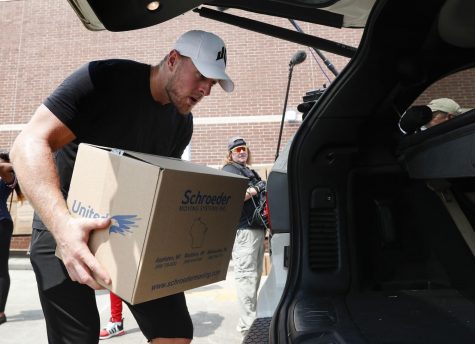Peanuts, salty snacks or the new Bubonic Plague
Researchers at Food Allergy Research and Education estimate that up to 15 million Americans struggle with food allergies.
“Take me out to the ballgame, take me out to the crowd. Buy me some peanuts and Cracker Jacks…” More like take me to the ER and buy me some Epinephrine.
Peanuts.
Just the word makes my throat tighten. With roughly two students in every classroom who suffer from severe food allergies, I feel that it is time for some light to be shed on this sticky situation. Or chunky situation, depending on which type of allergen-infested peanut butter people prefer.
Most high schools, including Klein Collins, have an open policy about the two-centimeter killer. However, other schools have indeed made the switch to a peanut-free environment to accommodate anaphylactic allergy sufferers such as myself. An anaphylactic reaction is when the airways swell and make it impossible to breathe. It happens very fast and is terrifying.
Other, more minor allergic reaction symptoms are swelling of the lips, hives, vomiting and acute stomach pain. Having experienced this torturous stomach pain first-hand, I describe it as feeling like a fat man is sitting on me and stabbing me with a piece of jagged glass while reciting quotes from “The House on Mango Street.”
High schools rarely make the switch to a peanut-free facility because high-school-age students should be able to manage and cope with their own allergies. While I completely understand that a few allergy victims should not be able to deprive everyone else of their beloved, indulgent snack, I believe that stricter policies should be enforced for safety reasons. Sophomore Sydney Batiste feels the same and says that being around peanuts and peanut-containing products gives her anxiety.
“When I am near peanuts, I get nervous really quickly,” she said. “I start freaking out and sneezing like crazy. And that’s just from smelling it. Eating it is a totally different story. ”
After having multiple allergic reactions, several at school and one on a school bus, I fully understand where she is coming from. If the presence of peanuts were controlled better, people who are allergic to them would no longer have to hide in a corner breathing into a paper bag to prevent themselves from inhaling the stench of peanut-y death.
I believe some precautionary rules should be put in place and enforced. Then, a lot of students and staff who cannot ingest this dangerous nut would be in a safer environment. Rules such as only eating peanuts in open areas, having knowledge of those who are allergic and not eating peanuts around the allergic people should be enforced. Even a trace of a peanut or peanut product can instigate an allergic reaction (I learned this lesson from a pack of M&M’s).
Just because someone has eaten peanuts before and only had a minor reaction, does not mean that they are immune to a serious reaction. Food allergies can worsen or develop at any age. According to Registered Nurse Jeanette Shackmann, if someone has a reaction, but has no registered medicine or Epi-pen at the school nurse station, all that the clinic can do is call 911 and wait. By the time an ambulance reaches the school, it could be too late.
All in all, whether people depend on peanuts as a loyal lunch companion, or despise them like rain at an outdoor wedding, they should be aware and considerate of those around them in how they handle them. Allergies are not fun, and peanut allergies in particular, can be inescapable and potentially fatal.









